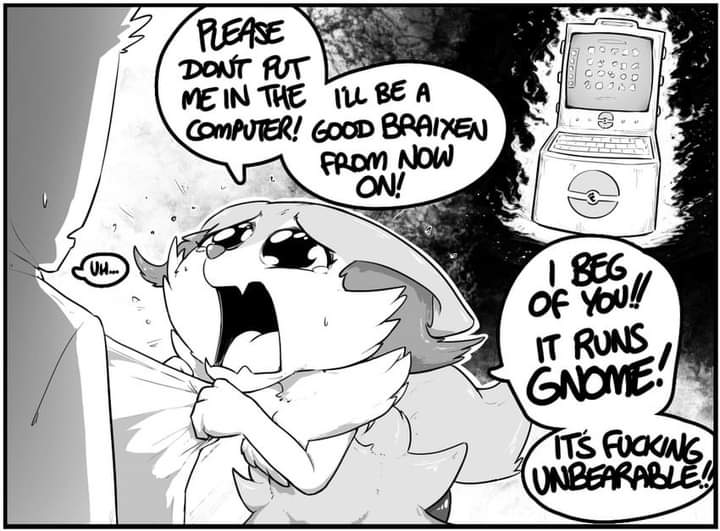this post was submitted on 26 Jun 2024
796 points (94.4% liked)
linuxmemes
21440 readers
884 users here now
Hint: :q!
Sister communities:
Community rules (click to expand)
1. Follow the site-wide rules
- Instance-wide TOS: https://legal.lemmy.world/tos/
- Lemmy code of conduct: https://join-lemmy.org/docs/code_of_conduct.html
2. Be civil
- Understand the difference between a joke and an insult.
- Do not harrass or attack members of the community for any reason.
- Leave remarks of "peasantry" to the PCMR community. If you dislike an OS/service/application, attack the thing you dislike, not the individuals who use it. Some people may not have a choice.
- Bigotry will not be tolerated.
- These rules are somewhat loosened when the subject is a public figure. Still, do not attack their person or incite harrassment.
3. Post Linux-related content
- Including Unix and BSD.
- Non-Linux content is acceptable as long as it makes a reference to Linux. For example, the poorly made mockery of
sudoin Windows. - No porn. Even if you watch it on a Linux machine.
4. No recent reposts
- Everybody uses Arch btw, can't quit Vim, and wants to interject for a moment. You can stop now.
Please report posts and comments that break these rules!
Important: never execute code or follow advice that you don't understand or can't verify, especially here. The word of the day is credibility. This is a meme community -- even the most helpful comments might just be shitposts that can damage your system. Be aware, be smart, don't fork-bomb your computer.
founded 1 year ago
MODERATORS
you are viewing a single comment's thread
view the rest of the comments
view the rest of the comments

I already mentioned the System Tray, back then I used MegaSync for cloud backups and that app was completely broken due to the lack of a Tray. (I have since switched to using Syncthing and an old laptop with a USB HDD as a ghetto """""NAS""""" solution... Which would probably work quite well on Gnome actually, as Syncthing is a service and is controlled through a web interface)
Wine stuff was janky as hell. As were Qt apps. For one thing wine applications, too, expected a Tray, and would instead spawn a tiny window at the corner for tray stuff. Plus there was weird behaviour with some windows and the way they layered. As for Qt apps? Gnome offered no features for setting the look of Qt apps, so if I set Gnome to dark mode (by the way, very neat feature how Gnome's default theme deals with that, no joke here, very seamless and elegant, even if I'd never use light mode willingly), Qt apps would still be bright and I had to just install a third-party application for it (qt5ct) and set something in my /etc/environment.
All of these things had solutions, to be sure, an extension for the tray, a third-party application for the Qt apps, etc. But then I did an
apt upgradeand literally all the extensions broke. So I had to spend an extra hour that day figuring out what I'd do about that. Joy of joys.Then there is the Gnome File Manager.
Why in the name of all that is unholy did it not let one type in the addresses of folders? Or copy them or... ? Sure, icons and breadcrumbs are nice, but being able to type in an address when you know it saves a ton of time. And maybe I want to copy a location to use it on the terminal? That should have been one of the first things to be implemented. Apparently a recent patch to Gnome has added the address bar "feature" (which has been part of Windows Explorer since 1994 and of every Linux File Manager I've known since forever--), but like. Bruh.
So I installed Thunar, the File Manager from XFCE, but now I was using a separate file manager entirely and having to deal with everything that comes with switching file managers from the DE's default. Like. WOW.
Sorry, I laughed out loud when I read that. Only in Linux land would we run into issues like this because stuff is modular so when things aren't the way something expects, shit breaks in the stupidest ways.
Oh I learned early on to either update super regularly so I can see what's breaking as it happens, or be careful upgrading. The number of times I've broken shit by updating software is insane (and not limited to GNOME). Even on macOS, the number of times I've fixed something by symlinking a library file to the same location with an older version name is stupid. I can see why people are interested in something like NixOS.
You could've just stopped there, I had forgotten how weirdly awful it was. The amount of time I spent getting that stupid thing to just fucking have options like "Open in Terminal" is insane.